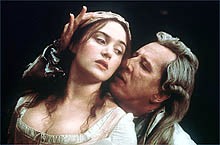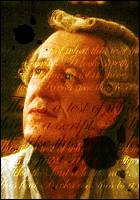
This is the pic used on the poster!
There was a buzz of excitement amongst the guests as we gathered in the courtyard and waited for the event to begin!
| Film Reviews 2000: |
| To conclude, Quills is one of the best pictures of the year. Sadly I do wonder if Oscar will overlook it because of its extremely sexual content. (4.5 of 5) So Says the Soothsayer. |
| Hey folks (and you Ruthe Stein), Harry here with a pair of damn luck and cool as a witch's ummmm.... wart fellas and their looks at Philip Kaufman's latest film... QUILLS which has been getting quite a few raves and is the first really solid film from Kate Winslet since TITANIC if this word holds up. And I'm glad because I think Kate is just absolutely radiant. Well hear about watching the film with George Lucas and all sorts of other celebs... here's Randfilms and Enigma Boy.... |
| San Francisco |
| And now comes the mighty ENIGMA BOY!!!! |

This is the pic used on the poster!
|
A series of Quills posters (film poster and enlargements of various magazine and newspaper articles about the film) were displayed on easels, lining each side of the center walkway of the courtyard. There was a buzz of excitement amongst the guests as we gathered in the courtyard and waited for the event to begin! |
| From the opening shots depicting a grisly beheading, it's clear that director Philip Kaufman plans to pull no punches in his portrait of the Marquis de Sade: The Asylum Years, known more pointedly as "Quills." Adapted by Doug Wright from his Obie-winning play, the story offers ample opportunity to push things to the limit -- this is, after all, the guy who lent his name to sadism we're talking about here. Subtlety isn't really an option. |
 |